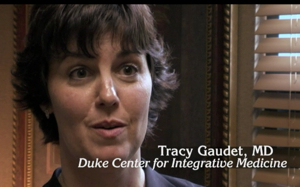Just as recent psychotherapies emphasize the healing power of the mind, a new approach to the practice of medicine draws on the inner resilience of each person to participate in recovery. The excellent documentary, The New Medicine, describes this emerging practice as rooted in a rejection of the artificial split between mind and body.
As the leading physicians featured in the film emphasize, states of mind and feeling do influence the course of illness. They are trying to change medical training to re-orient physicians to the human needs of patients and the importance of their active participation in healing.
This is a far cry from traditional medical training. As one physician says in the film, students learn a “hidden curriculum” during their years in medical school. It consists of the attitudes and values that restrict the attention of doctors to physical symptoms and the technology for treating them. Learning from what the faculty and residents do rather than say, they come to regard any response to a patient’s feelings or overall well-being as medically irrelevant.
One of the premises of the new medicine is that health and well-being depend on a balancing of all the dimensions of life: biology, feelings, values, spirituality, relationships, psychology. As one of the physicians in the film says, “If you disturb any one of these, you disturb all the others.” To respond to these multiple needs, more and more doctors are incorporating complementary methods, such as hypnosis, meditation, yoga and acupuncture.
Change in the training of medical students to make them sensitive to the human needs of each patient is one of the central themes of the documentary. At several schools, residents practice interviews with actor-patients to develop a compassionate style of relating to the people in their care.
One person, recovering from cancer, describes her interaction with a surgeon as a cold, belittling experience. When she talked with a doctor friend, he told her she didn’t have to settle for that sort of treatment. “You need a doctor,” she quotes him as saying, “who makes you feel empowered and smart, not passive and dumb.” When she found a caring physician who explained her options clearly, encouraged her questions and related to her with respect as well as compassion, she says she “felt returned to the land of human beings.”
A physician who offers alternative and holistic treatments at a clinic for the homeless frankly says in the film that she isn’t sure if these treatments make a difference in terms of medical parameters. But she is sure that the methods improve the quality of each patient’s life.
Another physician points out that patients come to a doctor’s office for one thing: hope. And hope, he says, is not like optimism, which looks for the best possibility in every situation. “Hope is clear-eyed.” It sees the possibility of failure but also the potential for a better future.
Unfortunately, many psychiatrists seem to be moving back to the traditional model of treating only the biological basis of illness. As Rachel Naomi Remen says near the end of this film, “Healing is about the will to live.” Medications and high-tech procedures can do only so much. Hopefully, doctors are learning to have as much faith in their patients as they do in modern technology.



It seems that today’s study, teaching, and practice of medicine and psychology is moving ever further away from philosophy and deeper into technology. When the philosophy is lost, the patient is also lost and becomes merely the subject of an experiment.
we can hope!
As an advocate for OCD awareness, I have come to realize that, as is discussed in your post, HOPE is what people need. Of course the right treatment and advice are important, but so many people want to hear the story of how bad my son’s OCD was (so severe he was not even able to eat) and how well he is doing now (senior in college living life to the fullest)…….his story is one of hope, and I think that is so important, no matter what illness you are battling. Thanks for this post!
Hi, Janet –
Thanks for your comment. I’m so glad to know that your son has recovered. There is an old TV series you can see in streaming version on Netflix (I think you can purchase also at Amazon) called Obsessed. It depicts the recovery from OCD of people by use of cognitive behavioral therapy and gradual exposure methods. Very powerful.
John
I liked two specific things here:
*Doing [the help] even w/o being sure it will make a “real” difference, because it improves the quality of life, and *seeing medical visits not so much about a cure (though that would be nice) as about HOPE.
I am a literalist, with a sharp mind and a stickler for the truth. So there are times when I feel conflicted as I give advice to someone. With a lot of reading and research under my belt, I usually have something to add to a discussion, and frequently from both sides.
What I’ve been trying to do lately is give the part that will offer hope. To say, “Here’s a possible good outcome you haven’t heard yet.” Of course there are negitive ones too, and (when I’m in a depressive mode) I feel like I’m being deceptive not to emphasize those as much (and that makes me a Bad Person!), but for the present I’m trying to make it about their need, not about how I feel, and that helps with the (concealed) negativity.
Most of the time.
Hi, Amy Jane –
The ideas about hope and quality of life also struck me as central to healing. What you say about “giving the part that will offer hope” reminds me how seldom I do that. Self-centering creates such a boundary around compassion, one I’m still learning to cross more frequently.
Thanks for your comment. I look forward to reading your blog – you seem to be one of those people I’d call an original. Wonderful.
John
Hi John,
I am very glad that you posted this article because I think you are on to something. It seems that over the past several centuries at least we have valued the mind over all other parts of our being. Perhaps earlier humans found that they had to in order to survive difficult conditions. However, it is becoming increasingly apparent that the mind body split is destructive.
It is unfortunate that modern medicine attacks symptoms as something to get rid of rather than with the curiosity to ask why the symptoms occurred in the first place. Our health system is at war with our bodies and therefore unable to really serve us well. According to Ayurveda, our symptoms and/or illnesses are the result of accumulated imbalances acting on our bodies and minds.
In Ayurveda, the mind and body are not separate. Ayurveda acknowledges impacts as always being systemic and holistic, so everything affects our bodies, minds, emotions and spirits. If you were to ask an Ayurvedic practitioner what kind of impact the Western lifestyle can be expected to have, you would likely find that the diet, stress and poor health habits would create depression as well as other illnesses.
It will take a lot of change to make us healthy again. Along the way Western medicine will need to admit its ignorance in some important areas. I hope they acquire the humility to do so. It is wonderful that there are some people in the field stepping up to the plate.
Hi, Maria –
Unfortunately, change in medicine (I’m more familiar with psychiatry) is going in both directions at once. A tiny minority are pursuing the ideas in this film, but a great majority are more fixated than ever on isolated disease, symptoms, drugs and elaborate technical procedures. The general concept of health seems irrelevant to a lot of contemporary practice. Thanks for your summary of Ayurvedic medicine. I need to know more about it, as well as Chinese medicine to understand more about the alternatives.
Thanks for your comment.
John
We can hope!